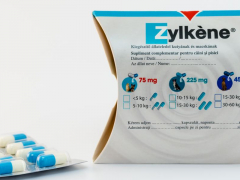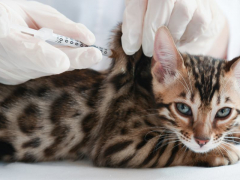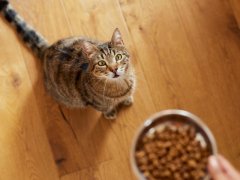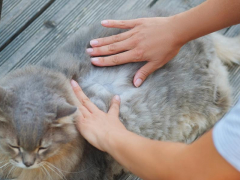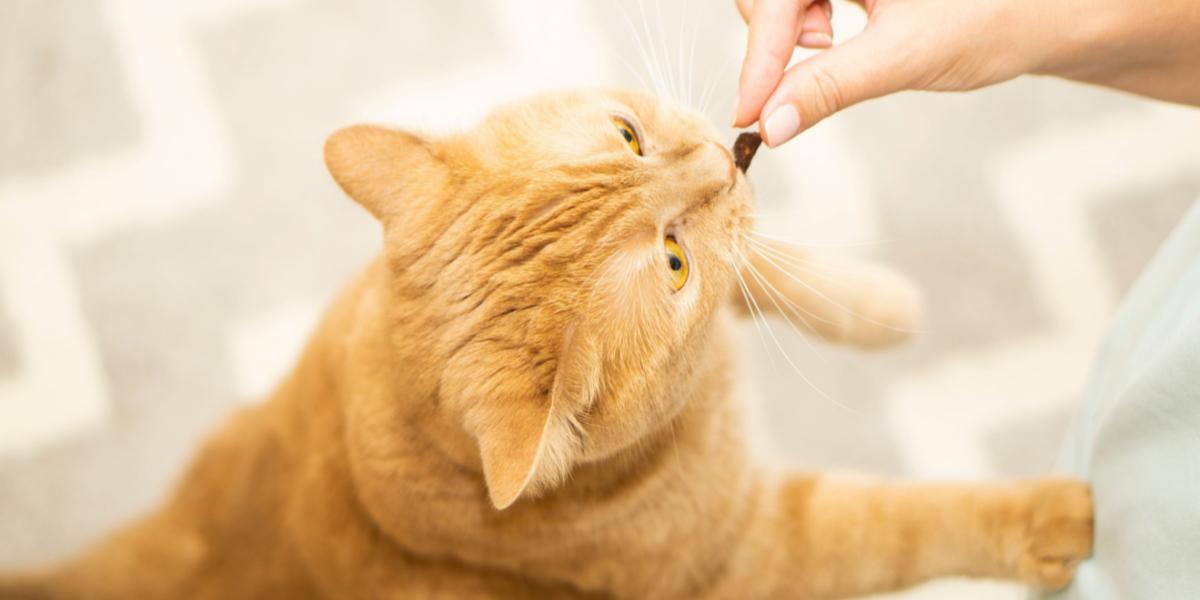
L-lysine, or lysine for short, is an amino acid supplement. It may be used in cats for immune support with the intent of curbing or suppressing the effects of the feline herpes virus (FHV). In this article, you’ll learn what lysine is, how it may help cats, potential side effects, and some frequently asked questions.
Quick Overview: L-lysine For Cats

About L-lysine For Cats
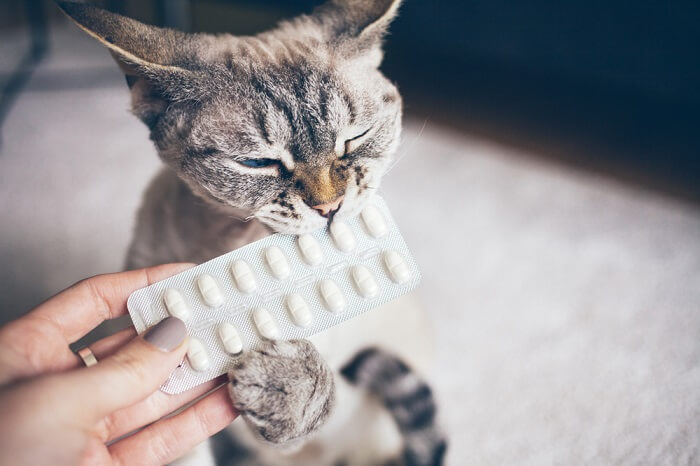
Cats that lead stressful lives, such as cats living in rescue shelters, are more susceptible to FHV.
Lysine is an amino acid. Amino acids are the most basic components of proteins and are needed for many processes within the body. These processes include the creation of new proteins, hormones, and neurotransmitters. There are a total of 20 amino acids, with some being essential and others considered non-essential.
Lysine is considered one of the essential amino acids, along with tryptophan, methionine, and a few others. Examples of some non-essential amino acids include alanine, glutamine, and arginine.
One way that Lysine is proposed to work to help cats is that it competes with arginine in its role with herpes viruses. Arginine is believed to be required for producing infective viral particles that allow a herpes virus to infect a host. When lysine is incorporated into the virus and outcompetes arginine, the virus is then thought to become less infective.
However, some research has refuted this method, showing that virus replication was not affected by low arginine levels. Lysine supplementation was also found to not lower arginine levels in several studies.
In humans, lysine has been found to have some positive effect on stress and anxiety.
What Does L-lysine Do For Cats?
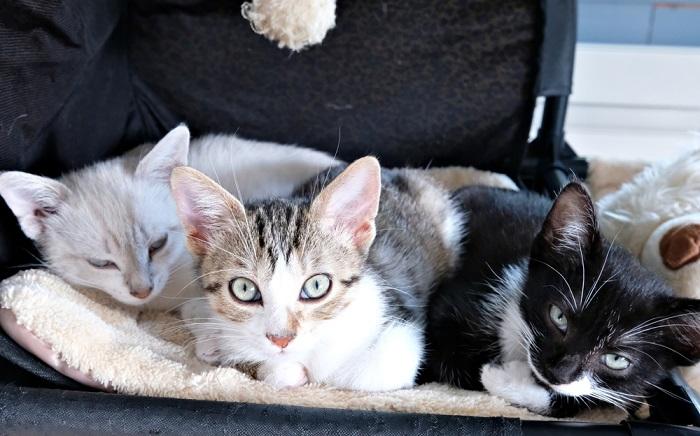
Very young kittens are often more susceptible to FHV.
Feline herpesvirus (FHV) and specifically feline herpesvirus-1 (FHV-1) is an extremely common virus that infects cats. It is especially common in very young kittens, cats with poor immune systems, and cats under a lot of stress, such as those in a colony or shelter environment.
Feline herpesvirus can cause conjunctivitis (eye inflammation) as well as upper respiratory signs of sneezing and nasal congestion in cats. A large majority of cats presenting with signs of sneezing and eye discharge have underlying herpesvirus infection.
The problem with herpesvirus is that while symptoms may come and go, it can never truly be removed from the body. Cats that have herpesvirus may continue to have flare-ups of conjunctivitis and sneezing throughout their lives. Flare-ups occur more often during times of stress, like during a move to a new home or the introduction of a new baby or pet that changes their familiar routine.
Feline herpesvirus can also predispose cats to secondary bacterial infections that can lead to worse signs like fever, heavy nasal congestion and inability to smell, bacterial conjunctivitis, lethargy, and poor appetite.
While improvements have certainly come along in the last 20 years, antiviral drugs generally have been more challenging to develop. This is because there are fewer parts of a virus for a drug to target than there are for bacteria. In addition, antivirals available, unlike most antibiotics, cannot cure a viral infection. Instead, these conditions require life-long therapy.
These challenges led to an interest in L-lysine’s potential to reduce the effects of herpesvirus symptoms through the administration of what is essentially a nutritional supplement that has very few perceived side effects.
Despite its promise, L-lysine has a varying record in research studies.
The use of lysine has been shown to suppress the shedding of the virus and to reduce the severity of conjunctivitis in experimental conditions.
However, at least in shelter cats, it has not been shown to significantly improve or prevent upper respiratory tract infections. Shelter cats are predisposed to a lot of stressors and potential infectious organisms, which can complicate treatment monitoring and outcomes.
In 2015, two virologists, Sebastiaan Bol and Evelien M. Bunnik conducted a review of studies on lysine supplementation in cats and in humans in regards to herpesviruses. They concluded that the studies they reviewed did not show any benefit to lysine supplementation in cats with herpesvirus. In one of the studies, viral shedding was actually increased in a group of shelter cats.
Shortly after the study was released, an article in Veterinary Practice News analyzed the findings in light of arguments for and against use of lysine in cats.
In it, Dr. David Maggs, a clinical veterinary ophthalmologist whose research on FHV was included in the Bol/Bunnik study responded to the conclusions:
“I was surprised by the conclusion,” Maggs said…“To say that there was no evidence strikes me as a little bit odd because they point out in their own manuscript that there has been at least one study that suggested a benefit.”
“[I] recommend perhaps a moderation of the final conclusion because I don’t think we can say that this drug should be stopped in all cats with herpesvirus,” Maggs said. “I think they’ve introduced a useful cautionary note of whether it should be initiated in every cat, but recommending an immediate cessation is probably a stronger conclusion that I would have drawn from the same data.”
“I have clients who tell me that every time they take the cat off lysine the problem returns,” he (Dr. Maggs) said. “Now that’s totally anecdotal evidence, but … I’m using it as an example that we should not recommend a blanket immediate cessation of therapy in all cats.
Another veterinarian, Dr. Gary Norsworthy is quoted in the article with a similar perspective to Dr. Maggs:
“[Lysine] is used frequently by many of my clients…” Dr. Norsworthy said. “Some cats have a very convincing response in spite of what the science says.
“I do not recommend it as a first-line treatment for feline herpesvirus-1,” he said, “but I also do not discourage it. Cats are not very conversant with the (research) literature. Its use should be based on response, whether scientific or not.”
Both veterinarians state the importance of anecdotal evidence for continued use of lysine in some cats. Anecdotal evidence is that which is collected by personal observation, such as by a doctor seeing the result of a treatment in a particular patient.
This perspective on anecdotal evidence is questioned by Dr. Bol in the article: “…Anecdotal evidence is no evidence. … Anecdotal evidence is a contradiction in terms.”
While formal research appears to not support lysine use in cats, veterinarians who have used it for many years may still recommend it based on improvements they’ve seen with their own patients.
These recommendations may be more common for use in household cats with a chronic history of herpes virus. Administering it to cats in the comfort of their own home may be less stressful and there may be fewer stressors complicating their health.
Side Effects Of L-lysine For Cats
Fortunately, side effects of L-lysine are rare. Adverse effects have not been observed in clinical trials. Overdose toxicity is also considered unlikely. However, gastrointestinal effects like decreased appetite, vomiting, and diarrhea can occur if a cat ingests a large amount of lysine.
L-lysine Dose For Cats
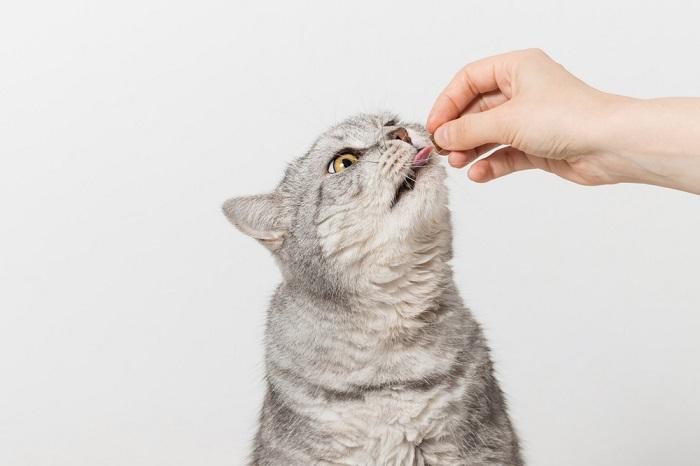
Cats may take L-lysine as a snack or treat, and it’s recommended that they consume it in one sitting.
There are many products containing L-lysine with the intention of being used as a supplement for cats. While many products may be labeled for use in cats and kittens, it is important to note that no products are FDA approved for treating or curing cats of herpesvirus, and all doses are considered extra-label.
- L-lysine gel (Viralys is a common brand but there are many generics) comes in 250mg per 1.25ml.
- L-lysine powder (Viralys, again, is a common brand with generics available) comes in 250mg per rounded scoop.
- L-lysine chews under the brand Optixcare have 500mg per soft chew treat.
The recommended off-label dosage for L-lysine in cats using one of these types of products is 205mg for a kitten or up to 500mg for an adult cat. Doses can be given once or twice a day.
Generally, it is recommended that a cat consume the entire dose in one sitting. For example, a kitty should consume all of the gel or chew it as a treat. If the powder is used and mixed with food, it should be eaten all at once and not snacked on throughout the day.
Administration of L-lysine should be a pleasant experience for your cat. The stress caused by forced administration is thought to possibly counteract any potential benefits.
Conclusion
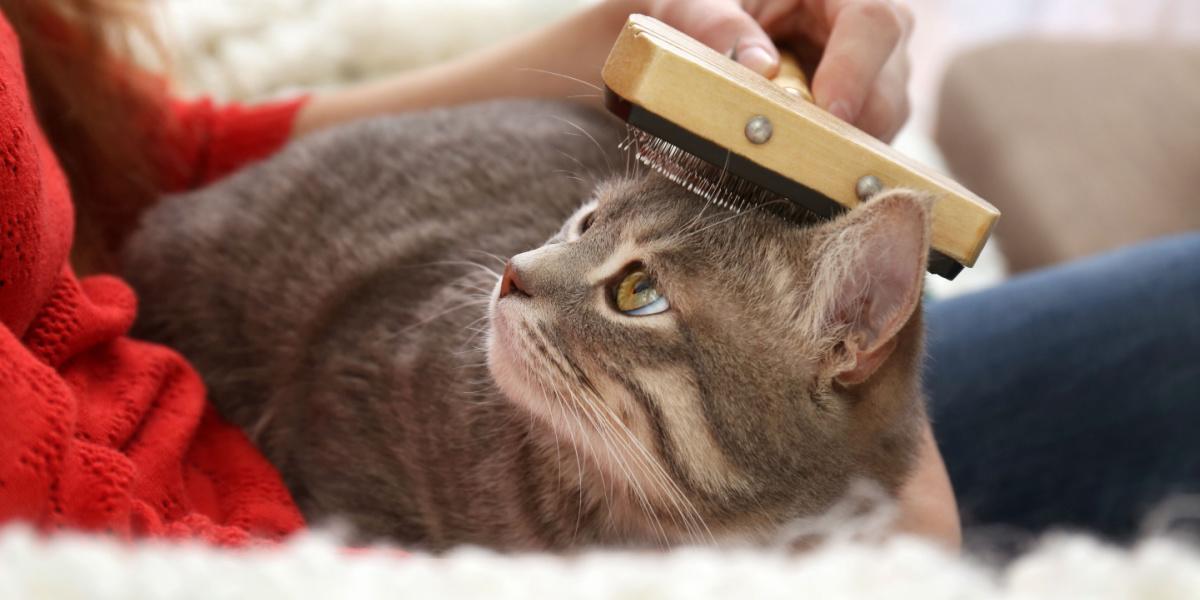
House cats that take L-lysine in the comfort of their own home are less susceptible to stress and gain the most benefits from it.
L-lysine may be recommended for use in cats suffering from chronic herpesvirus infection. While evidence for use to treat or prevent upper respiratory symptoms is variable, some vets continue to recommend it based on benefits they see in their patients. It may demonstrate the most success in house cats who live in a cared-for and less stressful environment. Its lack of significant side effects and perception as a nutritional supplement have made it a favorable option to help with the chronic herpesvirus.
Drug Dosing Disclaimer: We are only able to provide doses for medications that are FDA approved for use in cats and only as the label guidelines dictate. For medications that are used off-label we can only provide guidelines and safety information for use. Safe and appropriate dosing for off-label medications can only be determined by a primary care veterinarian.
We encourage you to work with your veterinarian to determine if a particular medication is appropriate for your cat. Changing or adjusting a dose for your cat on your own without consulting with a veterinarian can carry risk. We do not encourage use of medications prescribed for human use in pets without first consulting with a primary care veterinarian.
Frequently Asked Questions
How much L-lysine should I give my cat?
The general recommendation for L-lysine supplementation for cats is up to 250mg for kittens or up to 500mg for adult cats, given once or twice a day. For most products available, this equates to about 1ml of gel, one chew, or a single scoop of powder.
Can I give my cat L-lysine everyvday?
Yes. In fact, if you are using L-lysine as a supplement to help with herpesvirus symptoms, then it should be given every day. While L-lysine can be given during flare-ups as well, it likely has more preventive action for cats that show chronic signs of herpesvirus, if used consistently.
Can you give cats L-lysine?
Yes, but make sure to use a product intended or labeled for use in cats. Human supplements also exist, and should be avoided for use in cats. The forms intended for cats are less stressful to administer (in chew treat, tasty gel form, or as a flavored powder that can be mixed with food). Stress associated with the administration of L-lysine in cats may negate its potential benefits.
Does Lysine for cats have side effects?
While digestive upset is possible with very high doses, significant side effects have not been routinely observed in cats receiving L-lysine at recommended, labeled doses.
How long does it take lysine to work in cats?
The length of time for the effect of lysine to be seen can vary and may depend on the severity of the upper respiratory signs present, as well as how stressful the environment is. Any more severe upper respiratory infections or those complicated with bacterial infections will be less responsive.
Lysine may also be less effective in cats with pre-existing anxiety or fear-related behavioral disorders or in multiple-cat environments.
Generally, it will at least take several doses of lysine to expect improvement. Full effects of lysine supplementation may take up to several weeks but gradual improvement should be seen during that time.
Anecdotally, in cats who have been supplemented with lysine long-term but have it discontinued with a subsequent return of URI signs, owners have reported seeing benefits within 1-2 weeks of restarting lysine supplementation.
